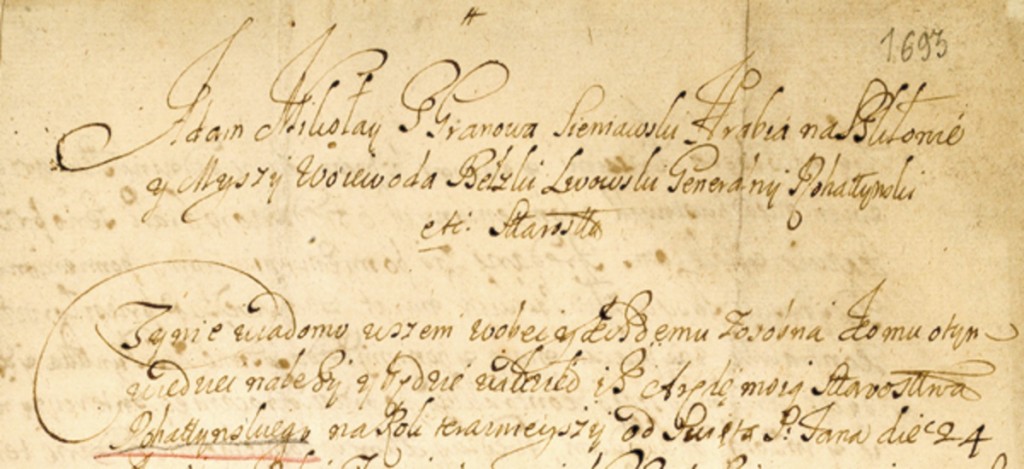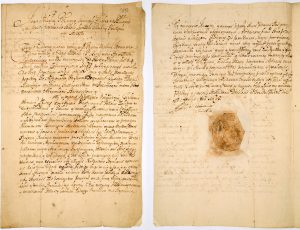![]() Ця сторінка також доступна українською.
Ця сторінка також доступна українською.
An interesting lease contract was signed in 1693, giving rights to tax revenues for the entire district (powiat) of Rohatyn to two burghers or freemen (mieszczanin) of the town, in exchange for payment. The document is fragmentary and partially illegible, but still both puzzling and fascinating. It’s titled Adam Mikołay P. Granowa Sieniawski Hrabia na [illegible] y Myszy woiewoda Bełzki Lwowski Generalny Rohatynski, etc Starosta. Here’s a translation, compliments of the Rohatyn District Research Group (RDRG):
To all and to everyone who ought to know, and where it is important to hear about it, [I announce] that I gave the lease on my Rohatyn District in the current year starting from the holiday of Saint John of June 24, 1693 until, God willing, next year of 1694 ending on the same day. I leased it for the sum of thirteen thousand of polish złoty to honorable burghers of mine, Moszko Juszkowicz and [illegible] Abramko Szajewicz.
Herewith in the town of Rohatyn [and the villages of] Podgrodzie, Firleiow, Czernia, Ruda, [illegible], Kleszczowna, Pottok, Zalipie, Wierzbilowce, and Załuże, and in my entire district of Rohatyn the above-mentioned leaseholders will collect the revenues that are due to me from distillery cauldrons, breweries, wineries, taverns, mills, road tolls that are collected in the town and in the villages. They will waive payments from the bridge collectors who are free to make beer, produce honey and hard liquor [illegible]. It is my order that those tavern owners who reside in the town of Rohatyn provide fourteen large jugs of alcohol to the peasants every week for twenty złoty. The leaseholders ought to make available beer, honey, hard liquor and [sell them] in a just manner. Those suburbanites and burghers who do not trade in alcohol […] [the next page is missing] [1]
To support needs of weddings, I recommend and order that all take seriously payments to the leaseholders of one hundred grzywna for non-indulgence. [2] According to this contract, the leaseholders are to pay eleven thousand złoty in four installments. I defer in the entirety other points of the contract and the decision regarding the past year interest rate, as such these obligations will become future responsibility of the [current] leaseholders. The collection of the interest and the balance owed by Leyb Jakubowicz [past leaseholder] is the responsibility of the current leaseholders. To assure greater attention [to this contract] and its accuracy, I sign in my own hand and confirm by the seal.
It took place in Dźwinogród on the day of 13 April in the year 1693. [3]
Signed: Sieniawski [seal]
Notes:
Kraków Wawel archive documents acquired by Dr. Alex Feller for the Rohatyn District Research Group (RDRG). Translation by Dr. Andrew Zalewski.

